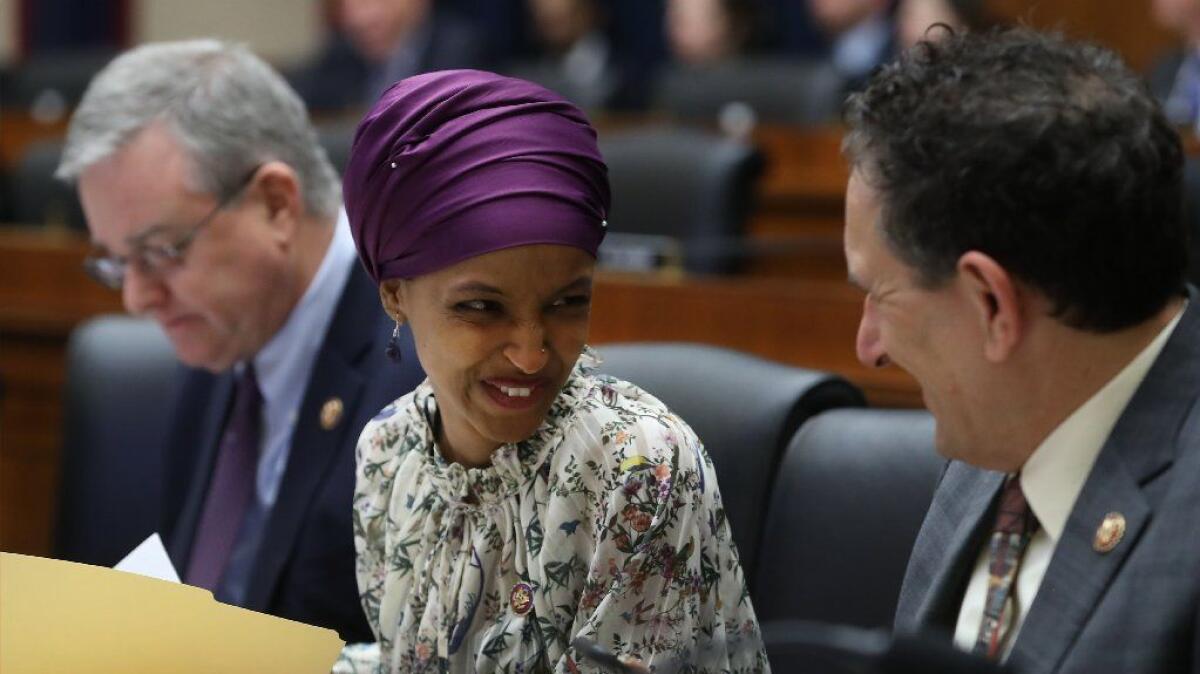How to avoid sounding anti-Semitic: A primer for politicians

- Share via
Reporting from Washington — The Democratic Party has a problem with anti-Semitism, and passing a resolution against bigotry won’t make it go away.
Democrats aren’t divided on anti-Semitism; they’re all against it. But one of their leftish new House members, Rep. Ilhan Omar of Minnesota, has made herself sound insensitive to anti-Jewish slurs — repeatedly.
That shouldn’t be hard to avoid. Most members of Congress, including progressive Democrats who are champions of Palestinian rights, know how to talk about Israel without sounding anti-Semitic.
But Omar, a Muslim American success story who came to Minneapolis as a 12-year-old Somali refugee, has flunked the test several times.
In 2012, Omar tweeted that “Israel has hypnotized the world.” Years later, as a candidate for Congress, she apologized.
In February, she explained the influence of pro-Israel lobbyists in Washington this way: “It’s all about the Benjamins, baby.” She apologized for that too.
This month, in an otherwise eloquent statement about the pain suffered by both Israelis and Palestinians, she warned of “the political influence in this country that says it is OK for people to push for allegiance to a foreign country.” This time she didn’t apologize.
Again, this shouldn’t be hard.
It’s OK to criticize the government of Israel, its policies and its practices. It’s OK to defend the rights of Palestinians, including their right to a state of their own.
It’s OK to ask if AIPAC, the pro-Israel lobby, is too powerful, or whether pro-Israel donors have too much sway. It’s OK to ask whether the United States should keep sending billions of dollars in aid to a country as prosperous as Israel. That’s not anti-Semitic.
But it’s not OK to suggest that American politicians who support Israel are guilty of dual loyalty, or that their votes in Congress are “all about the Benjamins.” Omar may not have intended those assertions as ethnic slurs, but they revived ugly anti-Jewish tropes.
The result was a week of unintended chaos for Democrats.
House Speaker Nancy Pelosi (D-San Francisco) papered over the problem by negotiating a resolution that denounced every imaginable kind of bigotry from racism to homophobia.
A whopping 407 House members, including Omar, voted for it. Only 23, all Republicans, voted no.
But the problem won’t go away.
For one thing, Omar hasn’t issued a clear, straightforward apology for her most recent gaffe. Her defenders insist that she’s “learning,” but they don’t sound entirely convinced.
“I know Ilhan Omar personally; I’m convinced she’s not anti-Semitic,” Rep. Ro Khanna (D-Fremont) told me. “I think she understands the hurt her remarks caused. I believe she does.”
For another, Republicans have every reason to keep the controversy alive. On Friday, President Trump made it overtly partisan with typical subtlety, telling reporters: “The Democrats have become an anti-Israel party. They’ve become an anti-Jewish party.”
That’s not remotely true — but the president and his reelection campaign would like it to be. Their all-too-transparent aim is to hang Omar’s words around the neck of every Democrat who’s running for Congress or the White House — and to conflate any criticism of Israel’s increasingly right-wing government with rank anti-Semitism.
U.S. policy toward Israel was already going to figure in Democratic presidential primaries, but the brawl over Omar could make the debate more treacherous.
Democrats once reflexively supported Israeli governments, especially when they were led by the center-left Labor Party. But Benjamin Netanyahu has been hard for Democrats to love — especially since the hawkish Israeli prime minister has passionately embraced Trump and the GOP.
Most Americans say they sympathize more with Israel than the Palestinians, but among Democratic voters the split is closer to 50-50 — with younger, progressive voters less sympathetic to the Jewish state.
Omar isn’t the only member of Congress who thinks U.S. support for Israel should be reined in. It was once virtually taboo for an American politician to defend Palestinian rights or advocate a Palestinian state. That’s no longer true.
It was noteworthy that three top-tier Democratic presidential candidates went to Omar’s defense: Sens. Bernie Sanders of Vermont, Elizabeth Warren of Massachusetts and Kamala Harris of California. All three are competing for support from their party’s progressive wing.
That guarantees that presidential debate moderators, whose job is to help candidates fight with one another, will look for divisions over Israel and keep the dispute alive.
So Democrats need to find ways to talk about these issues calmly and civilly, in a way that respects each side’s legitimacy. Khanna, a vice chair of the House Progressive Caucus, is among those already trying to mediate.
“Let’s see if we can channel this into something constructive,” he told me. “We need to have a dialogue, probably private at first, with ground rules.”
Once again, this shouldn’t be hard. The goal is a cease-fire in the Democratic Party, not peace in the Middle East.
And they have a strong incentive. If they can’t heal these wounds, Democrats risk seeing themselves defined by Omar’s hurtful tweets and Trump’s deliberate slander.
More to Read
Get the L.A. Times Politics newsletter
Deeply reported insights into legislation, politics and policy from Sacramento, Washington and beyond. In your inbox three times per week.
You may occasionally receive promotional content from the Los Angeles Times.











